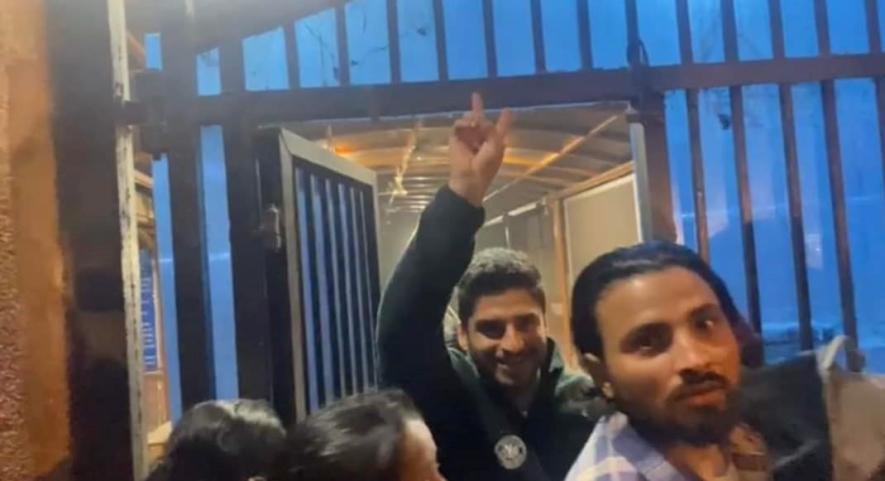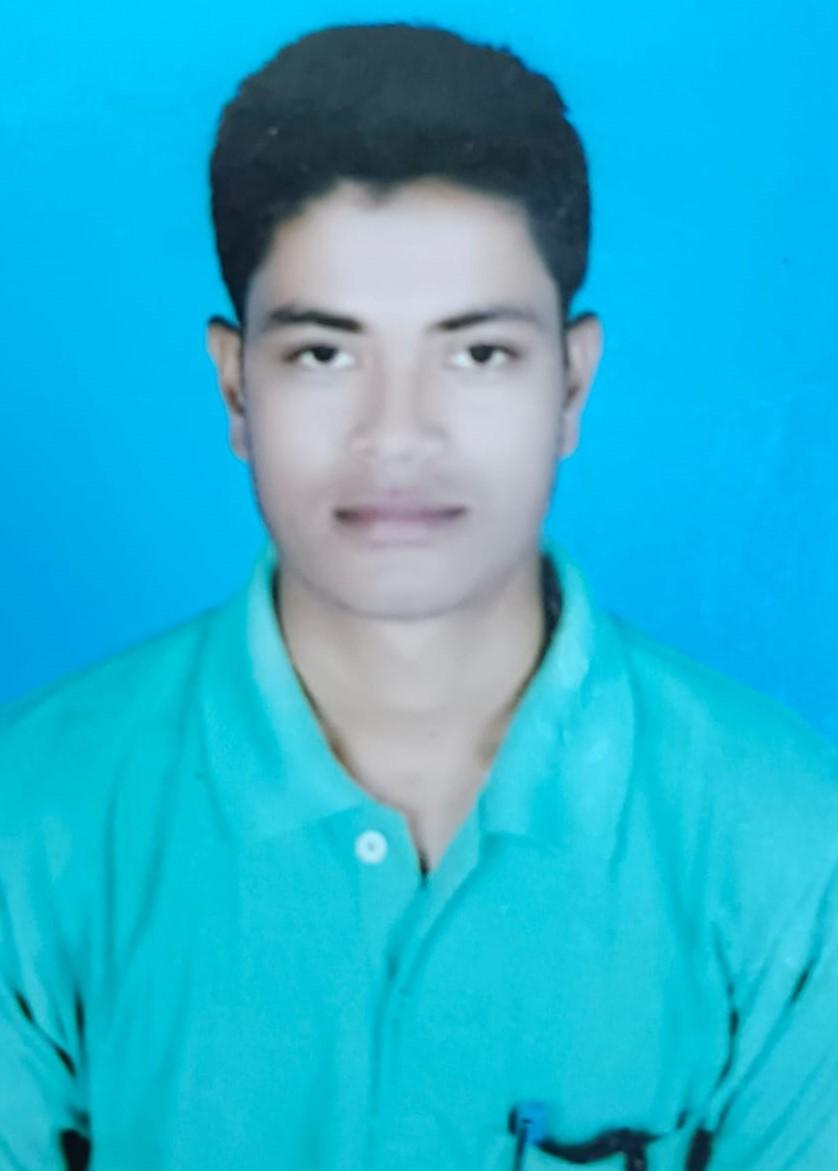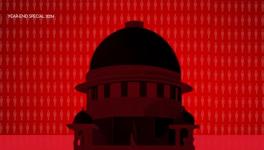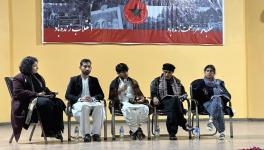Bail in 3 Cases Shows NIA Laxity, Insufficient Evidence
File Photo.
New Delhi: The bail orders of, at least, three terror accused issued by different courts show the National Investigation Agency’s (NIA) ‘lackadaisical approach’ in making arrests on ‘flimsy grounds’.
In the past too, dozens of people arrested on terror charges were found to be innocent in courts, questioning the intention and motivation of the country’s premier anti-terror agency, which failed to produce prosecutable material.
Newsclick delved deep into three recent cases wherein the accused have been enlarged on bail.
1. Fayaz Ahmad Khan (25), a labourer from Kupwara, Jammu and Kashmir, secured default bail on November 10 last year after the NIA failed to file a chargesheet within the stipulated 180 days (three months). He was arrested on May 14 under the stringent Unlawful Activities (Prevention) Act (UAPA).

After hearing his counsel advocates Tamanna Pankaj and Priya Vats and persuading the records, Dharmesh Sharma, the principal district and session Judge at the Patiala House Court, New Delhi, ordered Khan’s release on furnishing a bail bond of Rs 25,000 with one surety.
The NIA failed to even file a reply to the bail application.
2. Mannan Gulzar Dar, a young photojournalist from Kashmir who was featured in various international publications, was released on January 2 after the Patiala House Court found no direct and sufficient evidence against him.

The NIA accused Kashmiri photojournalist Mannan Gulzar Dar of working with Pakistan-based handlers/commanders of Hizbul, LeT, Al-Badr and others.
Dar was booked and arrested by the NIA in a militancy conspiracy case on October 22, 2021, and incarcerated in Delhi’s Tihar Jail.
The agency accused Dar of working with Pakistan-based handlers/commanders of proscribed terrorist organisations such as Hizb-ul-Mujahideen, Lashkar-e-Taiba (LeT), Al-Badr and others—under the United Jihad Council (UJC), led by Syed Salahuddin, to “execute a spree of targeted killings in the Valley in October 2021”.
It was alleged that Pakistan-based handlers acting on UJC’s directions decided to revive militancy in the Valley. They floated new “frontal organisations” namely The Resistance Force (TRF), People Against Fascist Forces (PAFF), Muslim Janbaaz Force, etc.
“Several online propaganda groups were floated on social media platforms for recruiting local youth, imparting training and grooming them to act as overground workers (OGW) to support active cadres and later act as ‘hybrid cadres’ to undertake small-scale attacks such as the targeted killing of minorities, security forces and political leaders to create unrest and spread terror in the Valley and other parts of India,” the NIA alleged.
The agency claimed that the data retrieved from the digital device and images and posters of killed militants associated with the banned outfits revealed that the accused was radicalised and used to receive information about the cadres of these organisations and was part of a “larger conspiracy”.
The NIA relied on the purported statements of protected witnesses who allegedly told the investigators that Dar was radicalised and working as an OGW for the terrorist outfits. The agency corroborated the purported statement from the disclosure statement of one Kamran Ashraf Reshi to establish that the accused allegedly used to attend lectures of a cleric of a mosque to “motivate youths for pelting stones on Army/police personnel”.
The NIA also alleged that Dar, under the garb of a photojournalist, used to share images of security forces, deployment and pickets on different groups on social media platforms.
The accused was charged under Sections 120B (criminal conspiracy) and 121A (conspiracy to wage, attempting to wage or abetting to wage war against the Government of India) of the Indian Penal Code (IPC) and Sections 18 (conspiracy), 20 (being member of a terrorist gang or organisation), 38 (membership of a terrorist organisation) and 39 (supporting a terrorist organisation) of the UAPA.
Representing the accused, advocate Tara Narula of the Association for Protection of Civil Rights (APCR) strongly opposed the prosecution’s case and submitted that the witness statements recorded under Section 161 of the Code of Criminal Procedure (CrPC) are “vague” and filled with “lacuna and discrepancies”.
Narula submitted that no physical evidence connecting the accused in any manner to any form of violence in J&K was collected during the probe. She contended that the chargesheet alleged that the accused was part of a conspiracy; however, the call detail records (CDRs) submitted to establish location, call log, etc. “does not support any such claim”.
“Even otherwise, CDRs, if any, would only establish the presence, which in itself also does not establish the factum of the alleged conspiracy,” she argued.
Narula further submitted that there is no evidence showing that the accused in any manner used to share images of force deployment and pickets under cover of a journalist. “All the allegations made are without any basis and evidence,” she told the court.
The court too found the digital evidence produced by the NIA while opposing the bail plea “insufficient”.
The digital evidence put forth by the prosecution also included images and videos of certain terrorist organisations. The agency told the court that some of the pictures were of known terrorists with their weapons as well as one hand-written paper mentioning the voice of “martyrs”, etc.
“Admittedly, there is no evidence at all showing sharing of any such photograph/image of security forces, deployment, etc. with any individual or organisation at any point in time,” the court observed.
“Moreover, the evidence is only up to the extent of such photographs/videos/images being stored in the mobile phone of the accused/applicant, which even as per prosecution case, also was being used by A-9 (the accused’s brother Hanan Gulzar). Therefore, taking into account all these evidence, on the face of it, it would be enough to observe, for the purpose of the bail application, that such evidence do not connect or are not sufficient to indicate the accused/applicant being part of a conspiracy or other charges,” the court concluded.
The court also rejected evidence like purported witness statements as well as analysis of the forensic report, which revealed that the Dar brothers (the accused) were users of Tele Selector xxxxxx2276, which was associated with the online propaganda group administered by Pakistan-based handlers of the proscribed terrorist organisations namely Resistance Force, Resist Till Exist and Al-Azibi (through which the accused was allegedly radicalising and working for protest ideology under cover of a photojournalist).
“This court would not go into a detailed scrutiny of the evidence, which, of course, would be carried out at the stage of charge, but it would be sufficient to say that none of the evidence referred to in any manner indicates any act of terrorist activity in any manner,” the court said in the bail order.
Even if it is accepted that the investigation revealed a new form of “hybrid or undercover cadres” indulging in terrorist activities and assisting proscribed organisations discreetly while ostensibly carrying on legitimate activities like those of an advocate or a journalist, the court said that “one must note that such allegation must be supported by direct evidence of any such activity”.
“Mere assumptions or incomplete evidence to establish such facts may not be sufficient,” the court noted while refusing to elaborately discuss purported witness statements but concluding that it “may not be conclusive”.
The court further said that having certain objectionable material in someone’s mobile phone that a “prudent person would have deleted ipso facto would not be sufficient for connecting the accused with the allegation/offences”.
3. Abdullah Saud Ansari (27), an alleged member of the banned Popular Front of India (PFI), was granted bail by a special NIA/ATS court in Lucknow on January 7. He was arrested last September during a nationwide NIA following the PFI ban.

The NIA alleged that Abdullah Saud Ansari had been an active member of the PFI since 2017.
The 27-year-old, who does odd jobs to earn a living, was booked under Sections 153A and 153B of the IPC and Sections 7, 8, 13(1)(a)(b) and 13(2) of the UAPA in FIR number 229/2022 filed at Lohta Police Station, Varanasi.
It was alleged that Ansari has been an “active member” of the PFI since 2017. The NIA claimed to have found materials related to the PFI and inflammatory speeches and provocative videos from his residence.
To prove his alleged association with the PFI, the agency claimed that he had shared the video of one Zafarul Islam making serious allegations against the NIA after PFI ban.
Investigators claimed that Ansari had admitted to his affiliation with the PFI and told them that he had been working with the organisation as an active member since 2017.
However, his counsel advocate Najmusaqib Khan contended that the prosecution “falsely” implicated the accused and there is no past criminal history. He also argued that the applicant went to the concerned police station to cooperate with the investigating officer; however, he was “illegally” detained and taken to judicial remand “without giving any information to his family, which is a direct violation of Section 41A of the CrPC.
Khan further argued that “the police put a lot of pressure on the applicant and made him sign several plain papers”.
Khan submitted that the investigating officer found no evidence to prove the connection of the accused to the banned organisation. “Neither his mobile nor other documents on record revealed any suspicious anti-national activities,” he argued.
The counsel relied upon the law laid down by the Supreme Court in Satendra Kumar Antil Vs Central Bureau of Investigation and others and Arnesh Kumar Vs State of Bihar and Anr.
Taking into account the submission of the counsel that the Sections imposed on the accused are punishable with imprisonment of less than seven years and he has been languishing in prison since September last year, Vivekanand Sharan Tripathi, additional district and sessions Judge (Special NIA/ATS Court, Lucknow) found sufficient ground to release him on bail on furnishing a bail bond of Rs 50,000 and two sureties of the like amount.
“It is clear from the perusal of the prosecution papers that in the present case, the accused is a member of the banned organisation PFI, and he was found in possession of material and video clips related to the PFI; however, it is the statement of the accused that no objectionable material has recovered from him. He has been arrested by the investigating officer after calling him to the police station on the pretext of questioning and the Sections imposed on him are punishable with imprisonment of less than seven years,” the court observed in its order.
Advocate Khan of APCR, which provides legal aid to the victims of ‘state repression’ pro bono, told Newsclick, “We strongly believe that every accused is deemed innocent until proven guilty. Bail is a rule and jail an exception as stated by the Supreme Court in the landmark decision in the State Of Rajasthan, Jaipur vs Balchand @ Baliay. I am thankful to the court that it accepted our contention and granted him bail.”
Get the latest reports & analysis with people's perspective on Protests, movements & deep analytical videos, discussions of the current affairs in your Telegram app. Subscribe to NewsClick's Telegram channel & get Real-Time updates on stories, as they get published on our website.
























